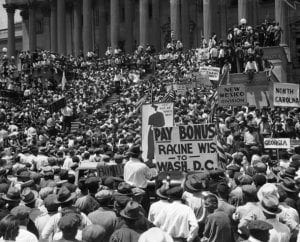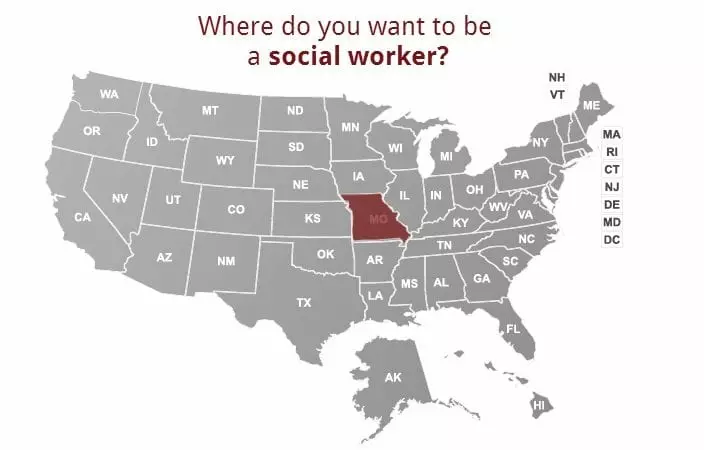
Throughout the series, I have taken you back to Washington D.C. during the Great Depression, alongside 25,000-45,000 WWI veterans protesting and lobbying for their Bonus checks that would help get them out of poverty. I analyzed two key tensions, Micro vs. Macro and Public vs. Private, in order to show you how they have had a dramatic impact on the way our country treats those who fight her wars. Now, I will tie everything together and demonstrate how these historical lessons can help us better serve our veterans today.
Similar to the Bonus Expeditionary Force (B.E.F.) veterans of 1932, modern U.S. military veterans are issuing grievances to the U.S. government, and anyone who will listen, over issues related to compensation. 82 years after the B.E.F., popularized as the Bonus Army, occupied our nation’s capital, 550,000 veterans who fought in Iraq and Afghanistan are waiting on average between 273- 327 days for their disability compensation claims to go through, often at the expense of their physical and mental health. While recognizing the U.S. government has made much progress since the time of the B.E.F., it is apparent that work still needs to be done.
Although society has widely accepted public assistance as a need for U.S. military veterans, there are hundreds of private agencies that still exist to serve the needs of the same veterans that the U.S. Department of Veterans Affairs (VA) serves, or aims to serve. This would suggest that the services provided by the public, federal government, are not adequately meeting the needs of U.S. military veterans. One must only consider the average wait on the VA’s disability claim back log mentioned previously to see the VA is not prepared to handle the rising needs of U.S. veterans.
While there is observable Public vs. Private tension among services provided to veterans, a question can also be asked in consideration of this tension: Does the U.S. government view the issues that military veterans face as being personal/private problems, or does it acknowledge that these are public issues brought upon individual veterans as a result of their time in military service? This question may be a topic for further investigation. While we can still observe Public vs. Private tension occurring among modern U.S. veterans and the U.S. government’s approach to serving them, we can see Micro vs. Macro tensions as well.
Through an analysis of all the services the VA provides U.S. military veterans, it is apparent that the VA takes a micro level approach, treating every veteran on a case by case basis, rather than having a focus on macro level systems to address environmental factors that might contribute to adequate care. We’ll see why this matters to society in a minute, but why does this matter to the field social work? Social work has been an integral part of veteran services provided by the U.S. government since 1929 and the VA is now affiliated with over 180 Graduate Schools of Social Work, training about 900 students per year. VA Social Work demonstrates its micro level focus in its mission statement which reads “The mission of VA Social Work is to maximize health and well being, through the use of psychosocial interventions for Veterans, Families and Caregivers” (2013). Psychosocial interventions aren’t necessarily the wrong approach, but it is near the foundation of micro level practice.
U.S. veterans, veteran service organizations, and even social workers within the VA, might benefit from following the social work trend and adopting or including a macro level approach to address modern day issues. After all, this series has shown that macro level approaches are historically the most effective at creating positive change and building security and autonomy for a group of disadvantaged individuals. It is through this intersection that the most profound implications of this series can be drawn.
In order to adequately address the needs of U.S. veterans, more work needs to be done at the macro level. Whether this manifests through the VA adopting new practices like creating a program with the sole focus of macro systems, social workers advocating and lobbying for macro changes in public policy, or veterans themselves recreating a physical effort at the scale of the Bonus Army in 1932; a macro approach larger than anything currently present must occur for the veteran population’s needs to be adequately addressed.
If U.S. veterans from around the country arrived en mass at Washington D.C. demanding legislation to end the VA backlog, support alternative healthcare measures within the VA, and to protect veterans benefits from any future government shutdowns or policy changes (three primary, widespread issues noted by the author); then modern U.S. veterans would be able to carry on the legacy that the Bonus Expeditionary Force left behind. Such an effort would require something that we don’t see very often: the participation and collaboration of the Veterans of Foreign Wars, American Legion, Disabled American Veterans, Iraq and Afghanistan Veterans of America, and the dozens of other national agencies that work with and for U.S. veterans. After all, collaboration among large veteran organizations was what finally led to the passage of a Bonus Bill in 1936.
I will conclude by saying this is not just an issue for U.S. veterans, it is an issue for society as a whole and in particular, social workers. Especially social workers who work within the U.S. Department of Veterans Affairs. Every U.S. citizen has benefited from the passage of the Bonus Bill and the GI Bill that followed; evident in the rise of the middle class during the 1950’s from millions of veterans going to college and buying homes. When U.S. veterans are adequately cared for, everyone wins. If social workers are called to “draw on their knowledge, values, and skills to help people in need and to address social problems” (National Association of Social Workers Code of Ethics, 2013), then social workers should not only help carry on the B.E.F. legacy, they should be using their knowledge, values, skills, and privilege as professionals; to lead such an effort from the front.
References:
Dickson, P. & Allen T. B. (2004). The bonus army: an American epic. New York, NY: Walker.
Iraq and Afghanistan Veterans of America. (2013). The wait we carry. Web. Retrieved Nov 26 2013 from https://thewaitwecarry.org/.
Martinez, M. & Couwels, J. (2013). Obama says backlog reduced in veterans’ disability claims. CNN. Cable News Network, 10 Aug. 2013. Web. Retrieved Nov 26, 2013 from https://www.cnn.com/2013/08/10/us/obama-veterans/.
National Association of Social Workers Code of Ethics. (2013). (n.d.)
United States Department of Veterans Affairs. (2013). Veterans services. n.d. Web. Retrieved Nov 26, 2013 from https://www.va.gov/landing2_vetsrv.htm.
VA Social Work. (2013). United States Department of Veterans Affairs. 2012. Web. Retrieved Dec 9, 2013 from https://www.socialwork.va.gov/about.asp.




